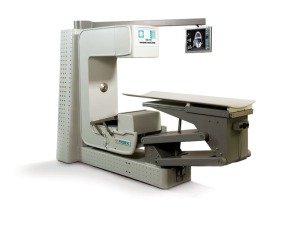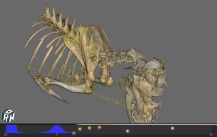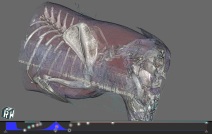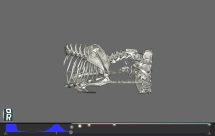Animal Accident & Emergency would like to introduce an Australian first. In December, AAE installed a CT scanner in our Point Cook 24Hr Emergency Centre. The CT unit by Fidex is a major advancement in technology and unique in many ways. Traditional CT units are common place in human and pet medicine. They work by taking several hundred radiographs and then using computer programs to “join” the images together. This allows the Doctor to look at body organs and structures in much more detail.
The new unit now operating at Animal Accident & Emergency uses the latest technology to combine a traditional style CT unit with an X-Ray unit and Fluoroscopy. The combination allows us to combined three different devices into one unit.
At present you would need three different units to perform a CT, an X-Ray or a Fluoroscopic study. The Fidex combines the functionality of the three different machines into one user friendly unit. One of the functions we love is seeing the images in a 3D perspective. It helps the pet owner visualise the problem that their pet has. We can even strip back tissue layers which is great for planning for complex cancer surgeries.
The Fidex unit has some major benefits to patients. It is able top generate X -Ray images using minimal doses of radiation. This means that we can take radiographs or perform a CT and the amount of radiation that the patient experience is far less. It also increases the safety for the Vet Team.
The unit itself is environmentally friendly. Traditional CT units require substantial amounts electricity to operate. They require a specialised air-conditioning plant to prevent them from overheating. Our Fidex uses minimal electricity, runs in any standard air-conditioned building and plugs directly into a normal PowerPoint. This also dramatically reduces the running costs of the unit which means savings for pet owners.
The unit is small, compact but mighty and we were able to install it in a standard sized room.
Our Fidex unit is the first in Australia and is truly a unique installation. The ease of use, lower radiation emission and speed of the unit means that we can provide sick pets with advanced imaging at a cost effective price. It provides more options then currently available at most veterinary centres.
Our specialists and Emergency team are using the Fidex for a variety of sick pet conditions. With trauma and road accidents, we can scan for internal bleeding as well as bone fractures. Our Medicine Specialist Dr Linda Abraham is able to perform cancer scans which help identify forms of cancer within the body.
The following are some of the used of the unit:
- Traditional X-Rays
- Looking at specific organ structure such as the lungs, kidney, liver, spleen, urinary bladder
- Used to help identify spinal problems
- Diseases of the nose
- Brain Tumours
- Head trauma
- Collapsing airways
- Angiography for heart disease
- Liver shunt identification
- Swallowing studies for oesophageal or gastric motility problems
- Elbow, knee and hip orthopaedic problems
To view the Fidex unit in action click on the following link: https://www.youtube.com/watch?v=hJQE1ZBkzvQ
For more information contact our 24hr Pet Emergency Centre: (03) 8368 7400

































